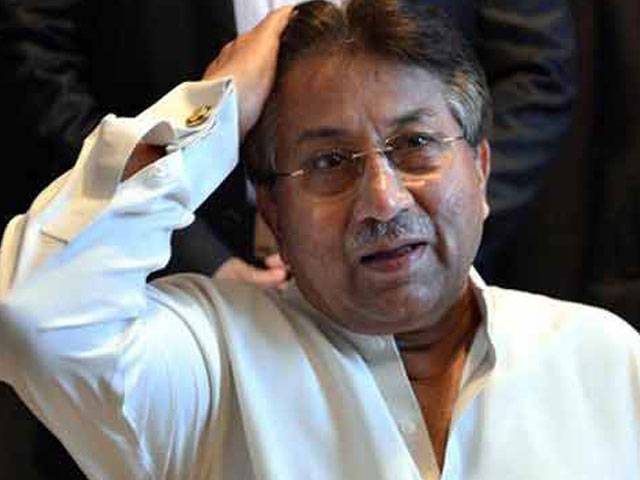ISLAMABAD - The federal government on Sunday announced to try former military ruler General (r) Pervez Musharraf for high treason under Article 6 of the Constitution over imposing emergency on November 3, 2007.
“Following the judgment of the Supreme Court and a report submitted by an FIA inquiry committee, it has been decided to start proceedings against Pervez Musharraf under Article 6 of the Constitution,” Interior Minister Chaudhry Nisar Ali Khan told a press here on Sunday. He said it was happening for the first time in the history of Pakistan and the decision had been taken in the national interest.
The minister said the government would write a letter to the chief justice of Pakistan, requesting him to constitute a tribunal of judges from three high courts to start proceedings against Musharraf for high treason.
The government would also announce a special prosecutor on Monday, he said, adding Musharraf had committed crimes against the people of Pakistan and the Constitution. He said nobody, not even the prime minister, could pardon him.
Nisar said Prime Minister Nawaz Sharif’s government came to power five months ago and it never demonstrated any revengeful gesture towards Musharraf. He criticised the former ruling PPP for presenting guard of honour to Musharraf and letting him go without any question about his unconstitutional actions.
The Supreme Court had referred the matter to the federal government to initiate a high-treason case against the former army chief for holding the Constitution in abeyance twice.
Article 6 says: 1[(1)-Any person who abrogates or subverts or suspends or holds in abeyance or attempts or conspires to abrogate or subvert or suspend or hold in abeyance the Constitution by use of force or show of force or by any other unconstitutional means shall be guilty of high treason.
(2)-Any person aiding or abetting or collaborating with any person in the commission of acts mentioned in clause (1) shall likewise be guilty of high treason.
3[(2A)-An act of high treason mentioned in clause (1) or clause (2) shall not be validated by any court, including the Supreme Court and a high court.
(3) 4-Majlis-e-Shoora (Parliament)] shall by law provide for the punishment of persons found guilty of high treason.
General (r) Pervez Musharraf is the first military officer to face the high treason case in the country’s military history. Political observers were divided over the belated government move to try the former military ruler for treason. Some were of the view it would open a Pandora box while others believed the move would help strengthen democracy in the country.
The former military dictator overthrew the Sharif government in a bloodless military coup in October 1999, but a year later the Supreme Court validated the takeover.
In November 2007, Musharraf imposed emergency rule second time, suspending the Constitution and sacking the top judges who declared his actions unconstitutional and illegal.
Musharraf technically became a free man this month when an Islamabad district court granted him bail over a deadly raid on a radical mosque in the capital in 2007.
His return to Pakistan in March was far from the triumphant occasion he had hoped for. He was barred from contesting the general elections which were won by Prime Minister Nawaz Sharif, the man he ousted from power in 1999.
Apart from Lal Masjid case, he faces charges of assassination of former Prime Minister Benazir Bhutto after an election rally in Liaquat Bagh Rawalpindi in 2007, death of Baloch nationalist leader Nawab Akbar Khan Bugti and detention of judges.
He was put under house arrest in April this year in an unprecedented move against a former army chief in a country where the military holds huge powers. Though he was granted bail in all cases, his name is still on the Exit Control List (ECL).
Saturday, April 20, 2024
Mush to be tried for treason
| Nisar says historic decision taken in national interest | Govt to ask CJP for tribunal comprising judges from high courts

New Zealand ram put down after death of elderly couple
April 20, 2024
Netflix beats expectations on profit and subscribers
April 20, 2024
A Tense Neighbourhood
April 19, 2024
Dubai Underwater
April 19, 2024
X Debate Continues
April 19, 2024
Hepatitis Challenge
April 18, 2024
IMF Predictions
April 18, 2024
Kite tragedy
April 19, 2024
Discipline dilemma
April 19, 2024
Urgent plea
April 19, 2024
Justice denied
April 18, 2024
AI dilemmas unveiled
April 18, 2024
ePaper - Nawaiwaqt
Advertisement
Nawaiwaqt Group | Copyright © 2024





